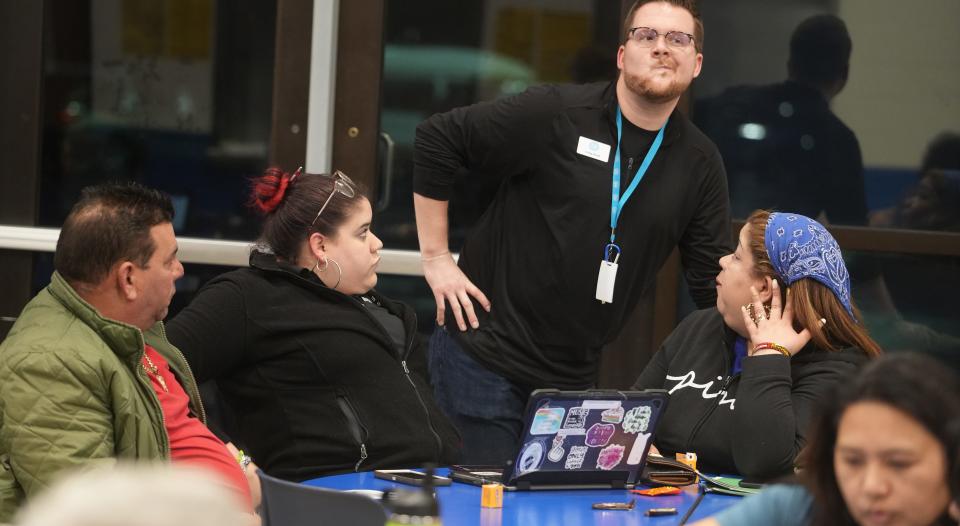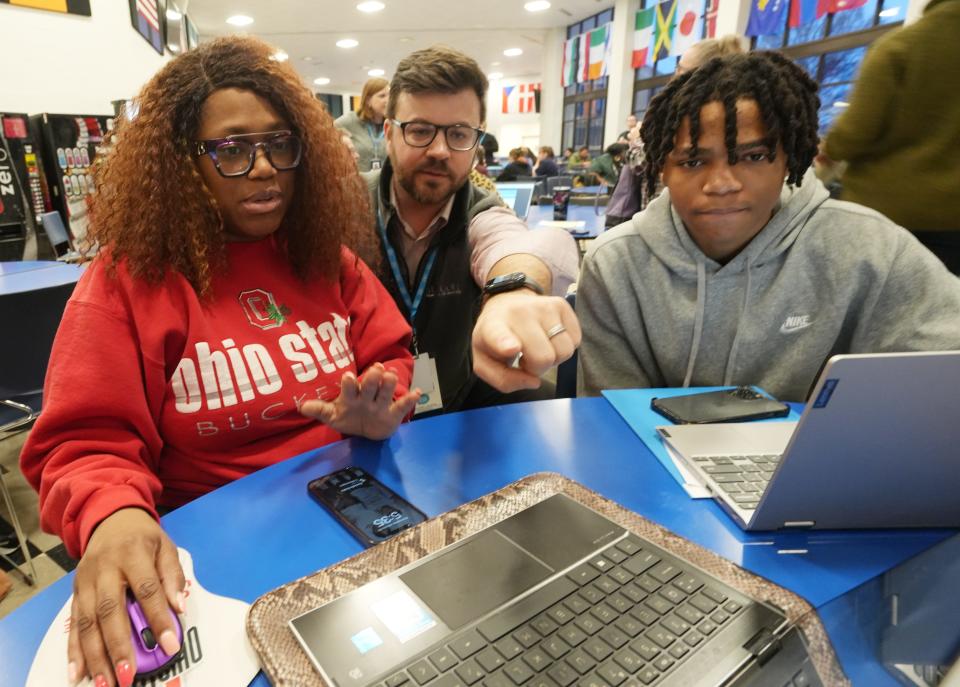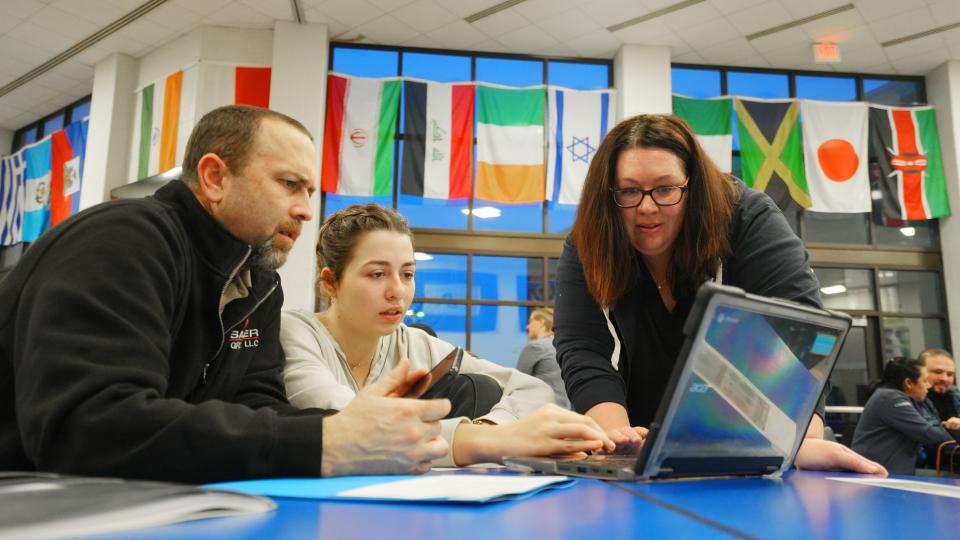'Rocky start' to FAFSA applications may delay financial aid from Ohio colleges to students
After weeks of waiting, Danel Fernandez logged onto studentaid.gov on New Year's Day to fill out the Free Application for Federal Student Aid (FAFSA) form.
He clicked the button to start a new form, but nothing happened. The webpage was down. He tried again the next day. Still nothing.
Fernandez, a third-year student at Ohio State University studying political science and public affairs, was finally able to access the FAFSA on Jan. 3.
"The design looked much nicer than the old FAFSA, and it was easier to fill out," Fernandez said. "That's all the compliments I can give it."
Higher education news: Changes are coming to FAFSA this month. Who are the college financial aid winners, losers?
The FAFSA got a long-awaited facelift late last month, which federal education officials promised would make the process easier to navigate. But families and students anxious to apply for financial aid were left waiting longer than expected after a slew of issues with the rollout, leaving some worried about how the changes could affect college decisions.
"It's been a bumpy and rocky start, to say the least," said MorraLee Keller, senior director of strategic programming at the National College Attainment Network, which tracks FAFSA completion nationwide each year.
The U.S. Department of Education did a soft launch of the updated FAFSA application on Dec. 30, 2023, a three-month delay after the FAFSA would normally open in October. Users are typically able to access the FAFSA 24/7, but glitches within the website caused the form to crash and randomly reopen for a few hours at a time since going live.
Other issues have included parents not receiving access links to their child's form via email, applications not saving, slow load times, dropping signatures from the form, and being unable to correct mistakes after submitting the FAFSA.
While the form has been open around the clock since Jan. 8, it's been anything but smooth, Keller said.
"A lot of people had pent-up energy. For those who had already exhibited a lot of patience, that has shifted to frustration," she said.

FAFSA changes were meant to make applying easier
In 2020, Congress passed the FAFSA Simplification Act, which updated the financial aid application process, expanded federal Pell Grant eligibility and significantly overhauled the systems used to award federal student aid starting this award year.
One of the most noticeable differences to the FAFSA is its length. What was once a cumbersome 108-question application is now just 36 questions. Questions related to Selective Service registration and drug convictions were among the items removed.
One change to the FAFSA's formula for awarding aid has the potential to hurt families' wallets and students' college choices.
Each year, the U.S. Department of Education adjusts its formulas to account for inflation. This year, it didn't make those adjustments.
Without considering inflation, that means more of a family's income will be calculated to apply toward financial aid. If a student appears to earn more than they've made in real terms, that could impact how much in Pell Grants they qualify for, or if they'd be eligible at all.
The Department of Education announced Wednesday that it will fix this mistake, but gave no timeline of when or how the new formulas will be implemented.

FAFSA rollout issue could affect students' financial aid, college decisions
Between the formula changes and delayed launch of the FAFSA, many within the higher education community are concerned about what this will mean for students' financial aid offers.
When FAFSA applications opened in October, colleges previously had months to test their systems and determine a student's financial aid package. But now colleges won't begin receiving student financial aid applications from FAFSA until the end of January, Keller said.
"If literally none of that work (by the colleges) can start until February, and it takes weeks to test their systems, we're not talking about award letters going out until March," Keller said.
That condensed timeline is putting pressure on financial aid officers and high school college counselors, said Kirsten Crotte, senior associate director of financial aid at Otterbein University.
"It is anxiety provoking," she said.
Stephanie Collins felt a tinge of that at a FAFSA workshop Wednesday at South-Western City School District's Central Crossing High School near Grove City that was hosted by I Know I Can, which says it is the only area nonprofit organization focused on helping students in Columbus City, South-Western and two other neighboring districts with college access, grants and career readiness.
Collins, whose twins Troy and Shelby are both Central Crossing High School seniors applying to college, had never filled out the FAFSA before. With a folder of tax information before her inside the high school's cafeteria, she and Troy worked with I Know I Can staffers to fill out the form. But they hit a snag once it came to filling out Collins' federal student aid ID.
Collins pointed to a note on her iPad's screen saying the ID would take up to three days to process. Her daughter Shelby plans to go to Columbus State Community College. Troy, who is applying to a mix of public and private Ohio colleges with annual tuition costs ranging from about $13,000 to $45,000, is thinking of applying to others.
But with application deadlines on the horizon, and financial aid packages playing a big role, Collins said she's a little worried about the delays.
"Since I've never done it before, I'm not sure what aid they'll even get at all," Collins said of her twins. "We're going to be running a tight schedule."
Crotte said prospective Otterbein students — who typically would've received an awards letter in early January — will hopefully know by early March how much aid they are eligible for.
"It's still a few months off until National Decision Day in May," she said, acknowledging that's "less time to ponder but still a significant amount of time."
Crotte said she sympathizes with students and their families dealing with the situation as she recently filled out the FAFSA with her own high school senior. The process was smooth enough, she said, but added that she understands how students applying to multiple schools at different price points and student athletes fighting for a roster spot would feel stressed.

What to know when filling out this year's FAFSA form
As frustrating as the process may be to fill out this year's FAFSA form, Keller said parents and students need to mentally prepare themselves.
"It's going to take persistence and grit, for the federal government to fix the issues, and for families to get through the form," she said.
Ashley Logan, director of college advising at I Know I Can, said her staff has been communicating with local college partners since before winter break to keep her staff updated on potential changes and updates with the FAFSA.
"We're all trying to be flexible and hopeful," Logan said.
Logan said I Know I Can has FAFSA workshops are scheduled at high schools throughout the Columbus area over the next couple of months to help students and families fill out the form. College adviser managers are also keeping a running list of problems and training folks on how to troubleshoot.
Crotte said to take a deep breath and don't submit your form until you're able to ask any questions you might have. While filling out the FAFSA is still the most important avenue to getting financial aid, Crotte also suggests looking for outside scholarships.
"Remember, everybody is in the same boat," she said. "You're not alone."
Sheridan Hendrix is a higher education reporter for The Columbus Dispatch. Sign up for Extra Credit, her education newsletter, here.
shendrix@dispatch.com
@sheridan120
This article originally appeared on The Columbus Dispatch: 'Rocky' FAFSA rollout might delay financial aid to Ohio students

